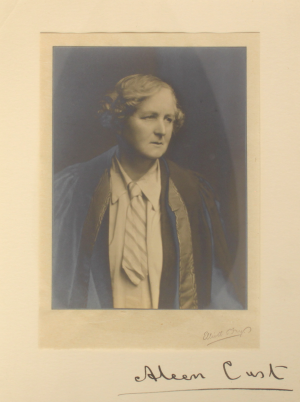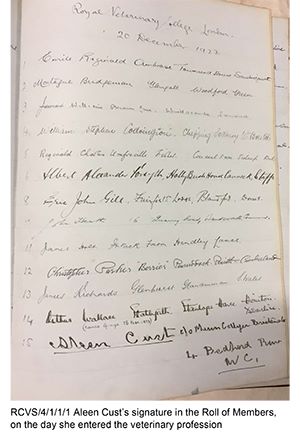Aleen Cust, first female Member of the Royal College of Veterinary Surgeons
In 1922, Aleen Cust became the first woman to join the RCVS Register, following the passing of the Sex Disqualification (Removal) Act 1919. However, Cust had completed her studies at the New Veterinary College in Edinburgh over 20 years previously, under the pseudonym ‘Arno Custance’. The Royal College of Veterinary Surgeons, which administered the qualifying examinations, refused her admission to the first examination in 1897 as she was a woman.
 [To read the documents referred to, please click on the relevant reference number to open the digital version available on our Digital Collections website.]
[To read the documents referred to, please click on the relevant reference number to open the digital version available on our Digital Collections website.]
Our Historical Collections contain many documents relating to the legal case brought against the RCVS by Cust and Professor William Williams, the Principal and founder of the New Veterinary College. Here is what the documents tell us:
Aleen Cust attended the New Veterinary College in Edinburgh for two years before applying to the RCVS to sit their first Professional Examination[1] in March/April 1897. At the Quarterly Meeting of the RCVS Council in April 1897[2], it is discussed as to whether the Council should admit Cust, and therefore set a precedent of admitting women in general. A vote was taken as to whether to permit her before any further action was taken, and this was voted down in favour of seeking the advice of Standing Counsel first. The assumption was that this matter would subsequently be decided in a Court of Law, and that the RCVS would act as decided by the Court.
George Thatcher, Solicitor to the RCVS, informed Aleen Cust that RCVS Council have denied her request for admission[3], after seeking legal advice, but Thatcher had been instructed to assist Cust if she should want to ‘try the question’. If she won the case, the RCVS were prepared to allow her to sit her exam in London instead of Scotland, so that she wouldn’t have to wait too long until the next round of exams in Scotland. The reasons given for denying her admission were:
1) This it is contrary to long usage and all precedent that women should be admitted to the Veterinary Profession
2) That the Act and Charter indicate that men only are eligible for admission to the profession.
Cust engaged Thomas M Horsburgh to represent her, who took the opinion of Counsel that it is ultra vires of the RCVS Council to refuse her. Horsburgh wrote to Thatcher that Cust had ‘instructed me to take the necessary steps to enforce her rights in this matter’[4].
"Act and Charter indicate that men only are eligible for admission to the profession"
Thatcher suggested that Horsburgh could use the Divisional Court in London, and the matter could be decided the following week. Horsburgh insisted the case be tried in the Court of Session of the Supreme Court of Scotland, both for the reason that Aleen Cust and Professor Williams are in Scotland, and that if this matter is decided by a lower court then the losing party might seek to appeal the decision which would take even longer[5]. Thatcher disagreed.
On the 8th May 1897 Mr Rutherford, the RCVS Secretary to the Board of Examiners in Scotland (and therefore deemed to be a representative of the RCVS) was served an ‘Arrestment in Execution’ by Professor Williams[6]. This was an attempt by Williams to affirm the jurisdiction of the Scottish courts in the matter. It is understood that Williams was suing the RCVS on the basis of lost revenue if Aleen Cust (and any other female students at his College) end their studies due to illegibility for the RCVS exams.
This matter was then pursued in the Scottish courts by Williams “and Another” (presumably Aleen Cust). The RCVS argued that the Scottish courts had no jurisdiction, ‘forum non conveniens’ (i.e. that this should have been tried in London), and ‘no title to sue’.
The case was put before Lord Kincairney on 3rd December 1897, and he dismissed it on the grounds of no jurisdiction[7]. Williams & Cust had until 30th December to Appeal the decision, but presumably did not. The RCVS Council discussed all this in the Quarterly Meeting on 13th January 1898[8], were relieved that the matter of jurisdiction avoided the precedent of being taken to court in Scotland in the future, and acknowledged that Cust could bring it up again in a London court.
We have nothing more regarding Aleen Cust in our archives until 1907, when a complaint was raised with the RCVS that she was mentioned in the Irish Times in a list of ‘Veterinary Surgeons’ at the County Roscommon Show. The RCVS sent her a letter informing her that claiming to be a veterinary surgeon when she is unqualified makes her liable to prosecution[9], so she should not attempt it in the future.
 The Sex Disqualification (Removal) Act 1919 meant that women were no longer barred from any professions. There is little mention of the passing of the Act in Council Meetings, other than acknowledging the fact that women were now entitled to enter the veterinary profession. Aleen Cust was excused from sitting all but the final RCVS examination, which she sat in London and passed on the 20th December 1922[10].
The Sex Disqualification (Removal) Act 1919 meant that women were no longer barred from any professions. There is little mention of the passing of the Act in Council Meetings, other than acknowledging the fact that women were now entitled to enter the veterinary profession. Aleen Cust was excused from sitting all but the final RCVS examination, which she sat in London and passed on the 20th December 1922[10].
Not long after finally appearing on the RCVS Register, Cust essentially retired from practice but continued an interest in the veterinary profession. She shared useful ‘Memories and Memos’ in an article in the Veterinary Record in 1934. Cust died suddenly during a holiday in Jamaica in January 1937. In her will she left £5000 to the RCVS as capital investment to fund a scholarship in veterinary research. According to Cust’s wishes, the Aleen Cust Research Scholarship could be awarded to persons of any age, born in England, Wales, Scotland or Ireland, and that when the RCVS Council was deciding between candidates of equal merit to ‘give preference to women’.
To read the documents referred to, please click on the relevant reference number to open the digital version available on our Digital Collections website.
[1] Applying to the RCVS to sit their first Professional Examination
[2] At the Quarterly Meeting of the RCVS Council in April 1897, it is discussed
[3] Informed Aleen Cust that RCVS Council have denied her request for admission
[4] Horsburgh wrote to Thatcher that Cust had ‘instructed me to take the necessary steps to enforce her rights in this matter’
[5] Horsburgh insisted the case be tried in the Court of Session of the Supreme Court of Scotland, both for the reason that Aleen Cust and Professor Williams are in Scotland, and that if this matter is decided by a lower court then the losing party might seek to appeal the decision which would take even longer
[6] Served an ‘Arrestment in Execution’ by Professor Williams
[7] The case was put before Lord Kincairney on 3rd December 1897, and he dismissed it on the grounds of no jurisdiction
[8] The Quarterly Meeting on 13th January 1898
[9] The RCVS sent her a letter informing her that claiming to be a veterinary surgeon when she is unqualified makes her liable to prosecution
[10] Which she sat in London and passed on the 20th December 1922
References
- News story. The Sex Disqualification (Removal) Act 1919: 100 years ago the Sex Disqualification (Removal) Act was given royal assent (2019) [Government Legal Department][online]. Available from: https://www.gov.uk/government/news/the-sex-disqualification-removal-act-1919 [accessed 13 December 2022]
- Cust, A. (1934) Memories and memos: From Miss Aleen Cust, M.R.C.V.S. The Veterinary Record, 14, pp. 363-365.
- County Roscommon Show (1906) The Irish Times, (August).